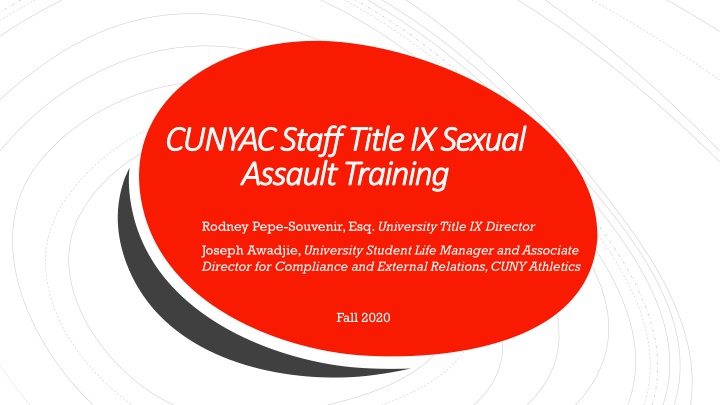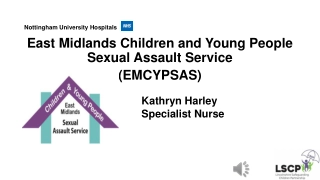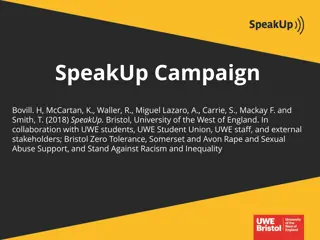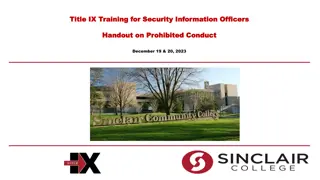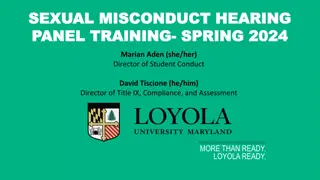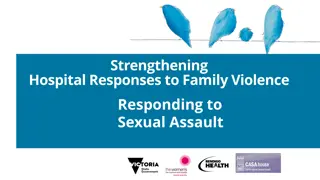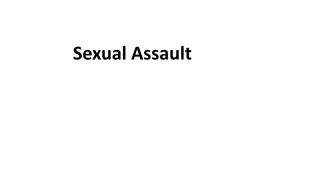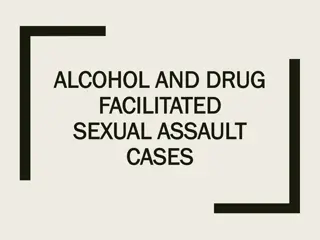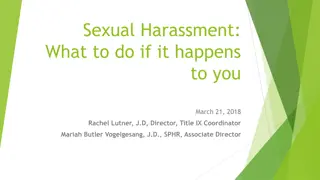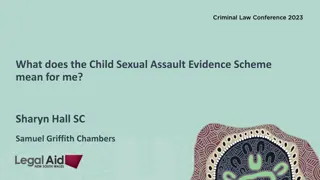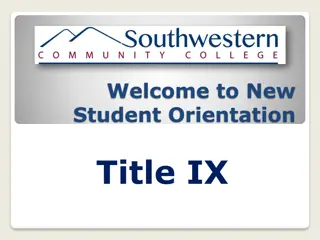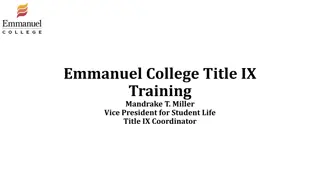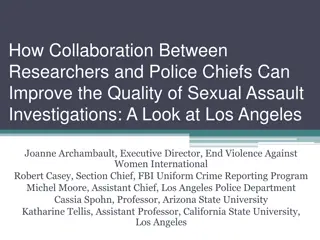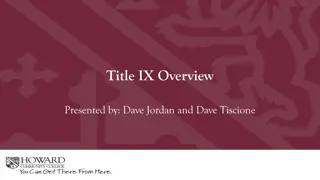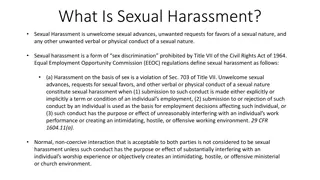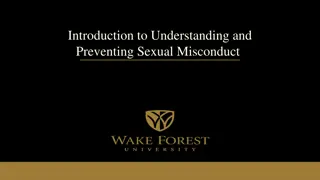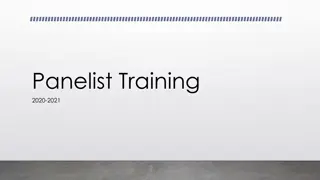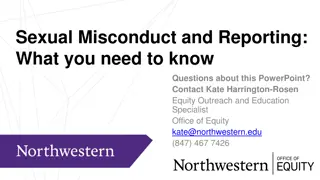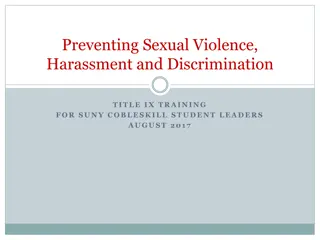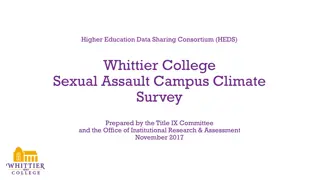CUNYAC Staff Title IX Sexual Assault Training
This announcement highlights the individuals responsible for overseeing Title IX compliance and sexual assault training at CUNYAC for Fall 2020. Rodney Pepe-Souvenir, Esq., serves as the University Title IX Director, while Joseph Awadjie manages University Student Life and serves as Associate Director for Compliance and External Relations at CUNY Athletics.
Download Presentation

Please find below an Image/Link to download the presentation.
The content on the website is provided AS IS for your information and personal use only. It may not be sold, licensed, or shared on other websites without obtaining consent from the author.If you encounter any issues during the download, it is possible that the publisher has removed the file from their server.
You are allowed to download the files provided on this website for personal or commercial use, subject to the condition that they are used lawfully. All files are the property of their respective owners.
The content on the website is provided AS IS for your information and personal use only. It may not be sold, licensed, or shared on other websites without obtaining consent from the author.
E N D
Presentation Transcript
CUNYAC Staff Title IX Sexual CUNYAC Staff Title IX Sexual Assault Training Assault Training Rodney Pepe-Souvenir, Esq. University Title IX Director Joseph Awadjie, University Student Life Manager and Associate Director for Compliance and External Relations, CUNY Athletics Fall 2020
3 CUNY s policies prohibit sex discrimination and sexual misconduct (sexual harassment, gender-based harassment and sexual violence) against any CUNY student, employee or visitor. Sexual harassment, a form of sex discrimination, is illegal under federal, state, and city laws and will not be tolerated within CUNY. CUNY s CUNY s Commitment Commitment We are committed to promoting a safe and secure learning environment for all members of our community. All students, faculty, staff, and visitors are expected to maintain a working and learning environment free from harassment and discrimination.
4 May 2020 Title IX Regulations Overview Title IX of the Education Amendments of 1972 ( Title IX ), 20 U.S.C. 1681- 1688 is the federal law that prohibits sex discrimination in education. A USDOE Press release on May 6, 2020 described the regulations as historic action to strengthen Title IX protections for survivors of sexual misconduct and to restore due process in campus proceedings to ensure all students can pursue an education free from sex discrimination. The regulations became effective on August 14, 2020.
5 Summary of Major Summary of Major Changes to PSM, Changes to PSM, necessitated by the necessitated by the regulations regulations Definition of Title IX Sexual Harassment Two sets of procedures Title IX Sexual Harassment Non-Title IX Sexual Misconduct Title IX Grievance Process
All new and transfer students must take SPARC when they initially enter the college. Other Specific Groups that Must Take SPARC: Student-athletes, students who study abroad (domestic/international), Heads of Student Organizations, and other designated campus groups depending on campus. Who Must Take Who Must Take SPARC SPARC Frequency: Student Athletes must be trained annually, even if they previously had been trained, but, if a student is going on a CUNY sponsored trip twice within an academic year, they only have to be trained once. Student-Athletes: Must be trained before they participate in intercollegiate competition Based on compliance requirements, the Central Office of Student Affairs will be auditing student athlete records in D2, D3, and NJCAA schools to ensure compliance with the SPARC requirement
Why Athletes are At Risk Why Athletes are At Risk Athletics is in an area of vulnerability: Star athletes may be insulated due to their status Same-sex complainants may be hesitant to make a complaint and disclose their sexual identity Traveling away from home could create dangerous environments Teams may engage in binge drinking Bullying can be an issue In fact, Enough is Enough legislation requires specific training be given to athletes because it is a high risk cohort.
Athletic Directors, Compliance Officers, and their designee will be responsible for enrolling the student-athletes into the SPARC training. Responsible for ensuring that student-athletes have completed the SPARC training before they participate in any intercollegiate activity. Athletic Athletic Directors/Compliance Directors/Compliance Officers Officers To confirm student athlete completion of SPARC, the following must be done: - Athletic Directors, Compliance Officers, and their designee can run a Query on CUNYFirst for new and transfer students - For returning student athletes, SPARC completion can be viewed in the Blackboard grade center All athletic staff must complete the employee sexual harassment training known as E-SPARC. The campus Title IX Coordinator will provide live training to athletic staff on Title IX protocol and procedures.
The Central Office of Student Affairs will be responsible for ensuring that all student athletes complete the SPARC training. All CUNY employees of the athletic department must complete E-SPARC Athletic Athletic Directors/Compliance Directors/Compliance Officers (cont.) Officers (cont.) and must participate in the live training. All Research Foundation (RF) employees must complete the RF state mandated sexual harassment training and must participate in the live training. If the athletics staff are not CUNY/RF employees, they will then be required to complete a live sexual harassment training conducted by the campus Title IX Coordinator before working with student-athletes.
10 Athletics departments must: Comply with campus authorities and ensure that all athletics staff, coaches, administrators and student- athletes maintain a hostile-free environment for all student athletes regardless of gender or sexual orientation Know and follow campus protocol for reporting incidents of sexual violence Report immediately any suspected sexual misconduct or sexual violence to appropriate campus offices for investigation and adjudication NCAA Executive NCAA Executive Committee Committee Statement on Statement on Sexual Violence Sexual Violence Prevention and Prevention and Complaint Complaint Resolution Resolution *Although not members of the NCAA, this slide also applies to community college athletes*
Athletics departments must: Cooperate with but not manage, direct, control or interfere with college or university investigations into allegations of sexual violence ensuring that investigations involving student- athletes and athletics department staff are managed in the same manner as all other students and staff on campus Provide education to athletes and staff, & assure compliance with all federal and applicable state regulations related to sexual violence prevention and response NCAA Executive NCAA Executive Committee Committee Statement on Statement on Sexual Violence Sexual Violence Prevention and Prevention and Complaint Complaint Resolution (cont.) Resolution (cont.) *Although not members of the NCAA, this slide also applies to community college athletes*
NCAA Expanded Sexual NCAA Expanded Sexual Violence Policy Attestation Violence Policy Attestation
The NCAA recently expanded their sexual violence policy, and student The NCAA recently expanded their sexual violence policy, and student- -athlete disclosure requirement which goes into effect in 2022 disclosure requirement which goes into effect in 2022- -2023 academic year. athlete 2023 academic year. The attestation process for the 2020 The attestation process for the 2020- -21 and 2021 schools to attest to the current policy. The 2022 schools to attest to the current policy. The 2022- -2023 effective period provides the campuses time to implement the NCAA expanded policy. campuses time to implement the NCAA expanded policy. 21 and 2021- -22 academic years will require 22 academic years will require 2023 effective period provides the Below are the NCAA Expanded Sexual Violence Policy Attestation Recommendations All incoming, current and transfer college athletes must disclose annually to their school whether their conduct has resulted in discipline through a Title IX proceeding or a criminal conviction for sexual, interpersonal l or other acts of violence. The policy also seeks their disclosure for any proceedings that are pending or were not completed. A failure by the athlete to accurately and fully disclose pending or incomplete hearings, a disciplinary action or criminal conviction may result in penalties, including a loss of athletics eligibility as determined by the school. Schools will need to take reasonable steps to confirm the information provided by prospective, continuing and transfer student-athletes and provide that information to other member schools if the student-athlete attempts to enroll in a different college or university. NCAA member schools must have policies in place to gather conduct-related information from former schools attended by recruited prospects or transfer student-athletes.
Prohibited Conduct: Sexual Harassment, Prohibited Conduct: Sexual Harassment, Gender Gender- -Based Harassment, and Sexual Based Harassment, and Sexual Violence Violence
Sexual Sexual Misconduct: Misconduct: Policy, Policy, Prevention, Prevention, and and Resources Resources Definitions of Title IX Sexual Harassment, Non-Title IX Sexual Misconduct and sexual violence This would include sexual assault, sexual misconduct, dating/intimate partner/domestic violence, stalking and voyeurism Policies and procedures- overview of changes to policy and other related policies Reporting incidents of sexual misconduct Confidentiality / Privacy awareness of who may and may not keep matters confidential
16 Sexual harassment, gender-based harassment and sexual violence, collectively referred to as sexual misconduct , are forms of sex discrimination prohibited by the policy. Sex Discrimination is treating an individual differently or less favorably based on sex, (including sexual orientation, gender or gender identity, and transgender status), as well as pregnancy, childbirth and related conditions. Examples of sex discrimination include giving a student a lower grade, or failing to hire or promote an employee, based on their sex. What Is Sexual What Is Sexual Misconduct & Sex Misconduct & Sex Discrimination? Discrimination? Anyone of any gender, gender identity, sexual orientation, physical or mental ability, religious affiliation, citizenship status, race, class or educational level can be a victim of sexual harassment and/or sexual assault. Sexual harassment and/or sexual violence can occur between members of the same sex/gender.
17 Conduct on the basis of sex that occurs in CUNY s education program or activity against a person in the United States and that The USDOE The USDOE defines defines Title IX Sexual Title IX Sexual Harassment as Harassment as satisfies one or more of the following: (1) a CUNY employee conditioning the provision of an aid, benefit, or service of CUNY on an individual s participation in unwelcome sexual conduct; (2) unwelcome conduct determined by a reasonable person to be so severe, pervasive, and objectively offensive that it effectively denies a person equal access to CUNY s education program or activity; or (3) Sexual Assault, Dating Violence, Domestic Violence, or Stalking as defined in this Policy.
18 Title IX Sexual Harassment Title IX Sexual Harassment Matters Matters If conduct meets the USDOE definition of Title IX Sexual Harassment must follow Title IX Grievance Procedure Parties are entitled to the Title IX Grievance Procedure if the alleged conduct meets the Title IX Sexual Harassment definition
Title IX Sexual Harassment Conduct on the basis of sex that occurs in CUNY s education program or activity against a person in the United States and that satisfies one or more of the following: On the basis of sex On the basis of sex The Regulations don t specify what this means. (1) a CUNY employee conditioning the provision of an aid, benefit, or service of CUNY on an individual s participation in unwelcome sexual conduct; CUNY s policy interprets based on sex to include sexual orientation, gender, gender expression and gender identity, including transgender status. (2) unwelcome conduct determined by a reasonable person to be so severe, pervasive, and objectively offensive that it effectively denies a person equal access to CUNY s education program or activity; or (3) Sexual Assault, Dating Violence, Domestic Violence, or Stalking as defined in this Policy.
Conduct on the basis of sex that occurs in CUNYs education program or activity against a person in the United States and that satisfies one or more of the following: (1) a CUNY employee conditioning the provision of an aid, benefit, or service of CUNY on an individual s participation in unwelcome sexual conduct; Title IX Title IX Sexual Sexual Harassment Harassment (2) unwelcome conduct determined by a reasonable person to be so severe, pervasive, and objectively offensive that it effectively denies a person equal access to CUNY s education program or activity; or (3) Sexual Assault, Dating Violence, Domestic Violence, or Stalking as defined in this Policy. that occurs in CUNY s education program or activity... Education Program or Activity is defined in the regulations to includes locations, events, or circumstances over which the recipient exercised substantial control over both the respondent and the context in which the sexual harassment occurs, and also includes any building owned or controlled by a student organization that is officially recognized by a postsecondary institution. 106.44(a)
Off campus activity does not necessarily mean the behavior is outside CUNY s education program or activity Off campus that likely is within CUNY s education program or activity: That occurs That occurs in CUNY s in CUNY s education education program or program or activity... activity... o CUNY sponsored trips or CUNY-related travel o CUNY sponsored events held off campus o Off campus review session organized by a TA Off campus that likely is not within CUNY s education program or activity: o Off campus review session organized by students o Off campus social gatherings among students o Off campus domestic/dating violence
22 Non Non- -Title IX Sexual Title IX Sexual Misconduct Matters Misconduct Matters Prohibited Sexual Misconduct that does not meet the USDOE definition of Title IX Sexual Harassment A different process which largely mirrors the CUNY investigation and adjudication process that existed under previous versions of the Policy, with a few changes and updates.
23 Sexual harassment is unwelcome conduct of a sexual nature, including but not limited to unwelcome sexual advances, requests for sexual favors, and other verbal, nonverbal, graphic and electronic communications or physical conduct that is sufficiently serious to adversely affect an individual s participation in employment, education or other CUNY activities. What Is Non What Is Non- -Title IX Sexual Misconduct? Sexual Misconduct? Title IX
Non-Title IX Sexual Misconduct Sexual Harassment can include, but not limited to, unwanted Sexual comments, teasing, or jokes Inappropriate or unwelcome physical contact, such as touching, groping, patting, pinching, hugging, kissing, or brushing up against an individual s body Examples of Examples of Sexual Sexual Harassment Harassment Sexual slurs, demeaning words, or other verbal abuse Graphic or sexually suggestive comments Inquiries or discussions about sexual activities Pressure to accept social and/or electronic invitations, to meet privately, to date, or to have sexual relations Sexually suggestive letters or other written or visual communications, including emails, texts, snapchats, photos and other social media communications
Gender-based harassment is unwelcome conduct of a nonsexual nature based on actual or perceived sex, including conduct based on gender identity, gender expression, and nonconformity with gender stereotypes that is sufficiently serious to adversely affect an individual s participation in employment, education or other CUNY activities. What Is Gender What Is Gender- - Based Based Harassment? Harassment?
Sexual violence is an umbrella term that includes sexual assault as well as dating, domestic and intimate partner violence, voyeurism and certain forms of stalking. Sexual assault is a crime. Sexual assault is any form of sexual contact that occurs without consent and/or through the use of force, threat of force, intimidation, or coercion. What Is Sexual What Is Sexual Violence? Violence? Sexual assault can be committed when someone has not given or is unable to give consent, for example, because of intoxication. Sexual assault can be a form of sexual harassment.
Any unconsented or unwanted sexual contact may constitute a form of sexual assault, this can include: Any form of sexual activity Sexual touching Grabbing/Groping Kissing Caressing Brushing against another s body Patting or rubbing Pinching Forms of Forms of Sexual Sexual Violence Violence
Dating Violence is violence or sexual assault committed by a person who is or has been in a social relationship of a romantic or intimate nature with the victim. Determining whether violence constitutes dating violence is based on facts presented by complainant. Dating violence can be a single act or a pattern of behavior, based on the frequency, nature, and severity of the conduct. A relationship may be romantic or intimate regardless of whether the relationship was sexual in nature. Dating/Intimate Dating/Intimate Partner/Domestic Partner/Domestic Violence Violence Domestic Violence is any violence or sexual assault committed by (i) a current or former spouse or intimate partner of the victim; (ii) a person with whom the victim shares a child; (iii) a person who cohabits or cohabited with the victim as a spouse or intimate partner; or (iv) anyone else covered by applicable domestic violence laws. Domestic violence can be a single act or a pattern of behavior, based on the frequency, nature, and severity of the conduct.
Stalking is: Intentionally engaging in a course of conduct directed at a specific person that is likely to cause reasonable fear of harm to another person or someone close to them Likely to cause such person to reasonably fear that her/his employment, business or career is threatened. Where stalking is directed at an individual with whom the perpetrator has, had, or sought some form of sexual or romantic relationship, it will be addressed under this Policy. Stalking that lacks a sexual or gender-based nexus may be addressed under the Code of Conduct. Stalking Stalking
The determination as to whether conduct is stalking can only be determined after examining all relevant facts. One incident on its own may not rise to the level of stalking, but if that one incident is severe enough, it may. Stalking behavior includes but is not limited to: Repeated contact of the complainant by phone, mail, email, social media, etc. Initiating contact with complainant after told to stop. Appearing at places the complainant frequents on or off campus. Stalking Stalking (continued) (continued)
Unlawful surveillance of an individual and incudes acts that violate an individuals right to privacy in connection with his/her body and/or sexual activity Voyeurism Voyeurism This includes dissemination of images to others who the individuals in the images did not consent to view the images
Understanding Understanding Affirmative Affirmative Consent Consent
Affirmative Consent Affirmative Consent Affirmative Consent is a knowing, voluntary and mutual decision among all participants to engage in sexual activity. Consent can be withdrawn at any time. Consent can be given by words or actions, as long as they create clear permission regarding willingness to engage in the sexual activity.
Affirmative Consent (contd) Affirmative Consent (cont d) Each person must clearly communicate his/her willingness and permission to engage in sexual activity. A person who is drunk or high may not be able to consent. Having sex with a person who is passed out, or slides in and out of consciousness, is rape. Failure to resist or say no, does not equal consent. Silence does not constitute consent. Past consent to sexual relations does not constitute consent to subsequent sexual activity. A person s appearance or dress does not communicate consent. During an encounter, a person may consent to certain sexual acts and not to others. A person under 17 years old cannot consent to sexual intercourse under New York law.
Students who are victims of or observe sexual harassment or violence while under the influence of drugs or alcohol, should report the incident and seek medical help. Students will not be disciplined for their drug or alcohol use. Students will be encouraged to participate in drug/alcohol education, assessment and/or treatment. may not apply to students who are involved in repeated incidents of drug and alcohol use. CUNY Drug & CUNY Drug & Alcohol Use Alcohol Use Amnesty Policy Amnesty Policy This policy does not protect students from discipline for other misconduct such as sexual assault, drug sales, causing or threatening physical harm, damaging property or hazing. Similarly, NY s Good Samaritan Law protects from arrest and prosecution individuals who call 911 when they witness or suffer from a medical emergency involving drugs or alcohol.
CUNYs Policies & Procedures Against CUNY s Policies & Procedures Against Sexual Misconduct and Sex Sexual Misconduct and Sex Discrimination Discrimination How to Report and Who to Report
CUNYs Policies CUNY s Policies Policy on Sexual Misconduct Policy on Domestic Violence and the Workplace Related Policies: Policy on Equal Opportunity and Nondiscrimination Policy on Workplace Violence Policy on Reasonable Accommodations and Academic Adjustments
Every member of the CUNY community, including students, employees and visitors, deserves the opportunity to live, learn and work free from sexual harassment, gender-based harassment and sexual violence. Policy on Policy on Sexual Sexual Misconduct Misconduct The University has professionals and law enforcement officers who are trained to assist student victims in obtaining help, including immediate medical care, counseling and other essential services, as well as reporting to law enforcement.
Faculty members and other employees are prohibited from engaging in consensual intimate relationships with students for whom they have a professional responsibility. For example: Policy on Sexual Policy on Sexual Misconduct: Misconduct: Student Student- - Employee Employee Relationships Relationships An athletic coach may not engage in an intimate relationship with a student on his/her team. A professor may not engage in an intimate relationship with a student in his/her course. Supervisors are strongly discouraged from engaging in consensual intimate relationships with non- student employees they supervise. Supervisors are required to report any such relationships to their supervisors.
Domestic violence can spill over into the workplace, compromising the safety of both victims and co- workers and result in lost productivity, increased health care costs, increased absenteeism, and increased employee turnover. Policy on Policy on Domestic Domestic Violence and The Violence and The Workplace Workplace CUNY is committed to full compliance with all applicable laws governing domestic violence in the workplace provide reasonable accommodations to victims of domestic violence Honor orders of protection to safeguard our employees; bring all orders of protection to the attention of Campus Public Safety. promoting the health and safety of all its employees participating in the fight to end domestic violence
Policy provides guidelines when students, employees or visitors request an accommodation or academic adjustments. The following procedures apply to reasonable accommodations and academic adjustments in connection with: a disability, pregnancy, childbirth, or a medical condition related to pregnancy or childbirth, religious practices, and status as a victim of domestic violence, sex offense or stalking. Policy on Reasonable Policy on Reasonable Accommodations and Accommodations and Academic Adjustments Academic Adjustments CUNY will thoroughly review all requests on a case-by-case basis and engage in a cooperative dialogue or interactive communicative process with the requester in accordance with applicable law. CUNY need not provide a requested accommodation that would constitute an undue hardship or that is not reasonable under the circumstances. CUNY prohibits retaliation against individuals for requesting reasonable accommodations or academic adjustments, appealing decisions concerning such requests, or for making or participating in claims of discrimination.
Bystander Bystander Intervention Intervention
CUNY expects that all other community members, including faculty, students and visitors will take reasonable and prudent actions to prevent or stop an act of sexual harassment, gender-based harassment or sexual violence that they may witness, including calling 911 or campus public safety. Bystander Bystander Intervention Intervention Taking action may include direct intervention, calling law enforcement, or seeking assistance from a person in authority. Community members who take action will be supported by the college and protected from retaliation.
How can employees and students safely intervene? Call 911/Public Safety. Take a picture of the perpetrator if possible. Bystander Bystander Intervention Intervention (cont d) (cont d) Separate the two people if it appears they are too drunk or if one might take advantage of the other. Help a friend to leave a risky situation and go home safely. Suggest a friend take a phone number and call the next day. Create a diversion Suggest a friend leave a party for a new venue. Tell a friend that someone else is waiting to speak to him/her. Tell a friend you need advice in private. Tell a friend you feel sick and need assistance.
Sexual Misconduct: Sexual Misconduct: The Complaint Process The Complaint Process
All individuals who believe that they have experienced or witnessed sexual misconduct are strongly encouraged to report the incident to campus authorities. Students should report to: Coaches Sexual Sexual Misconduct: Misconduct: Filing a Filing a Complaint Complaint Athletics compliance officers Athletics Director Title IX Coordinator or a member of the Title IX Team Office of Public Safety Office of the Vice President for Student Affairs and/or Dean of Students Campus President Human Resources Employees should report to: Title IX Coordinator or a member of the Title IX Team Director of Human Resources Office of Public Safety
CUNY is committed to investigating incidents of sexual misconduct that occur both on and off campus and giving support services/accommodations. In matters where the Respondent is a CUNY employee or student, but the Complainant is not a member of our community, the CUNY institution the Respondent is a member of will investigate and, if there is a finding of responsibility, move forward with disciplinary charges, where appropriate. If The Incident If The Incident Happened Off Happened Off- - Campus, Can I Still Campus, Can I Still File a Complaint? File a Complaint? In matters where the Complainant is a member of the CUNY community, but the Respondent is not, CUNY will provide Complainant with assistance and support services. If the Complainant is a member of a CUNY school and the Respondent is a member of a different CUNY school, both schools will work together, and the Respondent's school will conduct the investigation.
Complaints of sexual misconduct are promptly investigated by the Title IX Coordinator, or his/her designee with assistance from Public Safety and Human Resources where appropriate. What Happens What Happens After a Complaint After a Complaint of Sexual of Sexual Misconduct is Misconduct is Made? Made? The Public Safety Director is notified of all complaints of sexual misconduct, orders of protection and retraining orders. All students and employees are encouraged, though not required, to report incidents of sexual violence and sexual harassment to the NYPD. Public Safety will help the complainant make the report. The Campus will comply with and assist in the enforcement of court orders of protection.
Where appropriate, the College will implement interim and supportive measures to keep employees, our students, and the campus community safe. Student Student Interim & Interim & Supportive Supportive Measures Measures For students, examples may include: Security escort Class rescheduling/reassignment On campus counseling for students Academic assistance No Contact Order between Complainant and accused Accused placed on watchlist
Employees who are victims of sexual misconduct may be eligible for reasonable accommodations, including: Employee Employee Interim & Interim & Supportive Supportive Measures Measures Modifying work schedules Granting breaks or providing leave Moving to different office space Reconfiguring workspaces/equipment Providing assistive technology/equipment Free confidential support services through CUNY s Work/Life Program- Employee Assistance Program
